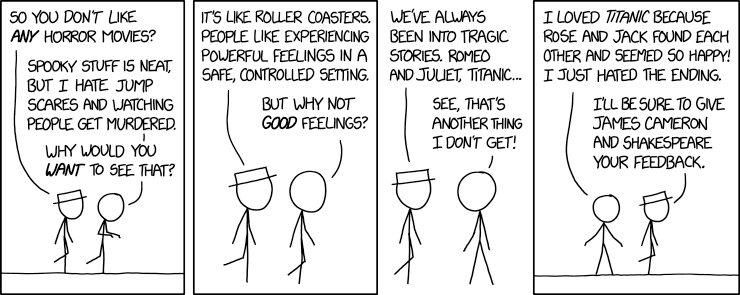Horror, and Why it's Not for Me

As usual, Randall Munroe says it best, even if he's arguing both sides of the issue here.
I once read that Akira Kurosawa would stress and fret over portraying the death of a character because he hated how it cheapened human life.
(One of the problems with being me is that I pick things up but rarely remember where I pick them up, so I'm terrible at sources. After thinking about this for twenty minutes, I'm pretty sure I got that factoid from an article written by Douglas Adams, talking about his two “ethical cops” in the first Hitchhiker's Guide to the Galaxy book. Of course, I don't remember where I found that article by Douglas Adams...)
Regardless of the connection to Kurosawa, I understand the sentiment. One of the things that distress me about the whole concept of horror or action movies is how blasé the characters are to the termination of a human being.
I Can't Even Handle Action Movies
Another reference for which I don't have a source: I saw a few seconds of some action movie on a demo computer at a university campus store, years ago. The protagonist and love interest were driving, chasing some bad guys. The bad guys shot the love interest dead and also shot the protagonist's car, forcing it to veer into the water. The protagonist got himself free, saw that his love interest was dead, and kissed her gently before swimming off to chase the bad guys.
And I couldn't deal with that scene. I still can't. If he had actually loved this woman that would have been the end of the movie. He would have pulled her out of the water, spent days or months or years trying to cope with the stages of grief, trying to make sense of a world where you kill someone because they disagree with you.
I'm sure the context was such that if he didn't continue to be a hero the world would have ended or some such thing, but I don't buy it. You just turned a woman— a person that we are supposed to believe had the full wealth of human qualities, the full gamut of uniquely human emotions and irreplaceable human value—into a reason for a character to be angry at people he was already trying to kill.
So Imagine how I Feel About Slasher Flicks!
So when you take that one step farther, into horror movies, where death is less of a sentence and more of an exclamation point, I'm even less okay with it.
I understand the “roller coaster” argument: everyone involved knows this isn't “really” real, that it's all just actors and makeup. But that undermines the very basis of fiction. The understood contract between the creators and consumers of fictive works is rooted in willing suspension of disbelief.
Of course I am aware that the actor on stage playing Hamlet will be back again for the matinee tomorrow. But Hamlet is dead. The reason drama works at all is because I can make myself believe he is dead, even if only for a few minutes while Fortinbras closes out the play.
So to suggest that we can at once accept that these characters are being senselessly butchered and also laugh because we know that it's all just red paint and latex is to disregard that contract. I can no longer suspend my disbelief, I can no longer make myself accept what the creators are attempting to portray.
Instead, the horror I feel is not from what is on screen, but from trying to comprehend the minds of hundreds of talented people getting together and spending millions of dollars to essentially feed sentient people into a meat grinder. The nausea I experience arises from trying to understand the mental state of someone who experiences joy when viewing that.
Come on man, it's just for fun!
Sure. I can accept that people who disagree with me aren't wrong for disagreeing with me. I understand that people enjoy things I don't.
But...how is that fun? Why is it enjoyable to watch people suffer? What makes it exciting to see others experience life-ending torture? Even if you don't care about willing suspension of disbelief, even if you can “handle it”, I have never been able to comprehend the mindset that would make you want to handle it.